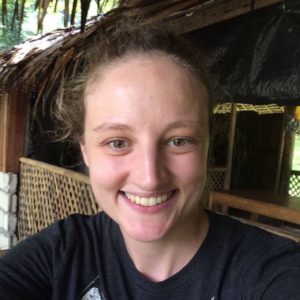
Lucie Baumont
POSTDOC
| Contact Information | |
| E-mail: | lucie.baumont [at] cea [dot] fr |
| Office: | 281 |
| Affiliation: | IRFU/DAp-AIM |
Research Interests
I am a cosmologist who specializes in weak gravitational lensing. Under the standard cosmological paradigm, 95% of the energy density of the Universe comprises unknown entities: dark matter and dark energy. Though dark matter is invisible, we can map its distribution throughout the Universe by studying the distortion, or shear, of images of distant galaxies due to intervening dark structure along the line of sight. The lensing signal on a single galaxy is tiny compared to the intrinsic spread in galaxy shapes, so we must extract it statistically over many thousands or even millions of galaxies!
I have experience with all stages of weak lensing measurements: observations at the telescope, pixel level processing astronomical images to remove the instrumental signature, measuring shapes and photometry, and finally extracting cosmological parameters.
I use weak gravitational lensing to measure the masses of galaxy clusters. Masses from weak lensing are unbiased on average, and as such, play a vital role in cluster cosmology measurements including those of the baryonic mass fraction and cluster counts. I also make cosmological measurements using weak lensing higher order statistics. Such measurements can capture non-gaussian information on small scales that will be probed by the Euclid and Rubin LSST surveys.
I completed my PhD in New York at Stony Brook University, where I was supervised by Anja von der Linden. Here, I worked on pixel level processing of DECam images, galaxy shape measurements and shear calibration with metacalibration, and constraining cosmology with measurements of the cluster gas mass fraction.
I am a member of three international science collaborations: the Euclid Consortium, Rubin LSST Dark Energy Science Collaboration (DESC), and UNIONS.
Integrating practices from agile software development into physics research is another interest of mine. During the 2023 Euclid Consortium meeting in Copenhagen, my colleague Jennifer Pollack and I hosted the Euclid's first Sprint Day, featuring nine events throughout the day that featured brainstorming and software hack sessions, as well as software demos. Over 70 members of the Euclid Consortium participated in this first-ever event! I also co-organized the inaugural Euclid Cluster Cosmology Hack Week, in September 2023, which gathered participants across various cluster working groups to facilitate development of a unified cluster cosmology analysis pipeline.
You can hear me talk about some of my research for Euclid public outreach at CEA in this video.

